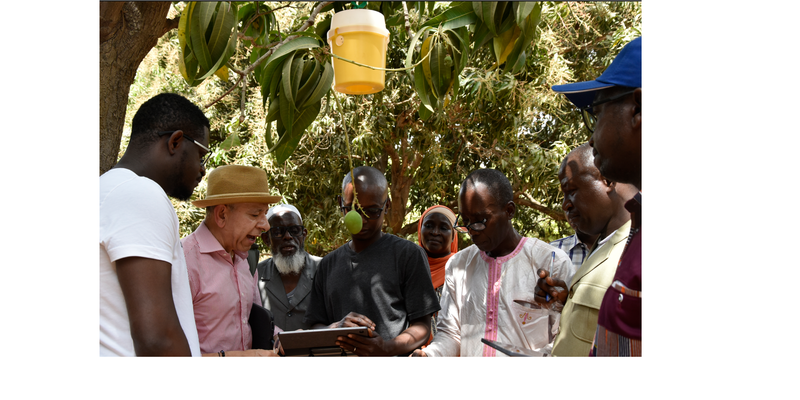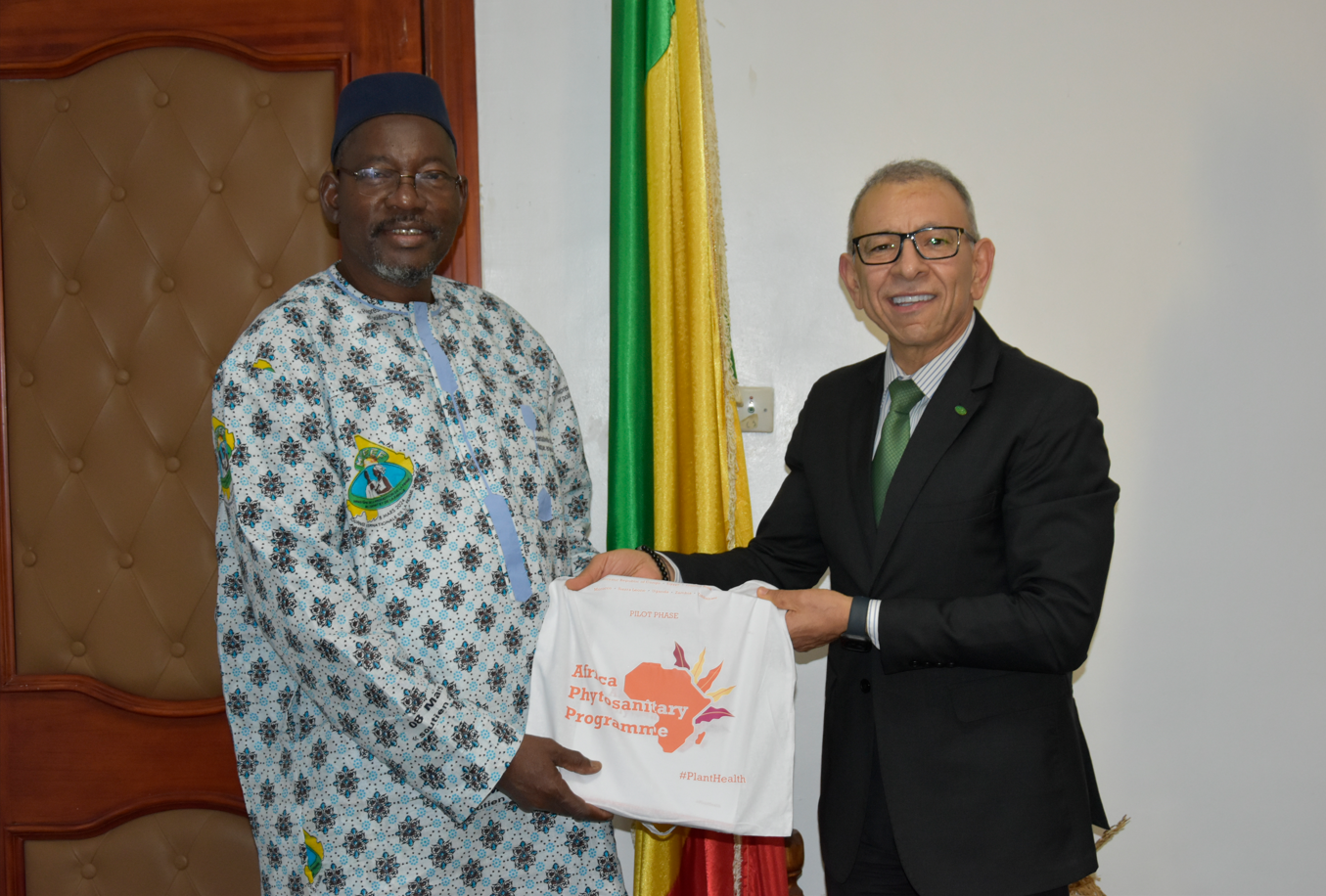SPOTLIGHT: IPPC promotes science and technology to save mango production and trade in Mali
Posted on Fri, 15 Mar 2024, 07:44

©FAO/Anita Tibasaaga
Moustafa Coulibaly and his family have been involved in mango production for about 50 years. Coulibaly and his brothers are part of a group of 15 farmers operating a four-and-a-half-hectare mango orchard in N’toubana locality, Koulikoro region of south-western Mali. Although it is possible for the group to harvest several tonnes of mango, mainly for sale but also for home consumption, the biggest portion of what they produce each season is lost to the menacing Fruit fly (Bactocera dorsalis- one of the most widespread Fruit fly species).
“Managing and preventing Fruit fly is the biggest threat to mango production in this area,” said Coulibaly. “Once the rainy season starts, the nightmare starts as well because the Fruit fly population explodes, and the damage begins. We are using several approaches to manage and treat Fruit fly, including using pheromone traps: but with little success,” he added. Despite their efforts to manage the pest, neigbouring mango producers do not control Fruit fly and so the problem persists.
Through a new initiative called the Africa Phytosanitary Programme (APP), the International Plant Protection Convention (IPPC) Secretariat aims to restore hope for farmers like Coulibaly, by empowering phytosanitary personnel of national plant protection organizations (NPPOs) to use advanced scientific approaches to carry out proactive pest surveillance and data collection for timely response to pests such as Fruit fly and Fall Armyworm.
Mali is a principal mango growing region in Africa. Mali’s Plant Protection Department, which is also the NPPO of Mali, estimates that mango exports contribute about 8 billion CFA franc or USD 14 million a year. According to the World Bank, in 2015, Mali produced 600 000 tonnes of mangoes worth USD 30 million in exports. However, due to Fruit fly, importers such as the European Union, have previously intercepted Mali’s mango exports.
Through APP, the IPPC Secretariat is working with the NPPO and the Ministry of Agriculture and Rural Development of Mali to transform the capacity of phytosanitary personnel, including field technicians, to use modern technology to carry out active pest monitoring and improve their data collection, storage, and retrieval by using computer tablets fitted with APP customized software. These tools are envisaged to help the NPPO make faster, more informed, and timely decisions to prevent Fruit fly and other pests whose impact has environmental and economic significance for the country. Mali is one of the 11 countries in the pilot phase of APP.
Mali is one of the 11 countries in the pilot phase of APP, which is coordinated by the IPPC Secretariat, supported by the African Union’s Department of Agriculture, Rural Development, Blue Economy, and Sustainable Environment and the United States Department of Agriculture (USDA).
Commitment to transformation in Mali
Through APP, the IPPC Secretariat aims at safeguarding plant health, agriculture and natural resources against the introduction and spread of plant pests. It also aims at promoting safe trade and expansion of international and regional market access for agricultural products by supporting NPPOs to facilitate compliance with the International Standards for Phytosanitary Measures. Leadership, governance and partnership are therefore crucial for realizing these goals and effectively implementing the programme.
To implement APP in Mali, the IPPC Secretariat is working closely with the Ministry of Agriculture and the Food and Agriculture Organization of the United Nations (FAO) Representation in Mali.
“Mali welcomes APP, a well-articulated intervention using modern science to help in timely management of pests like Fruit fly,” said Monsieur Lassine Dembele, Mali’s Minister of Agriculture. Dembele was speaking at a meeting with Osama El-Lissy, IPPC Secretary, on his working visit to West African APP pilot countries, in March 2024.
“APP echoes the efforts of the Ministry, particularly in capacity development and will significantly elevate the expertise of phytosanitary personnel. Mango is very important for Mali but pests like Fruit fly severely affect production. If it is possible to eradicate this pest, then we can save the mango and the income of our farmers,” he added.
Dembele also noted that the Ministry “has all the services required to do this work and will ensure a coordinated approach to support the national coordination point with the required materials.”

©FAO/Anita Tibasaaga
“APP is a journey, and the IPPC Secretariat is committed to providing the tools and science to empower NPPOs in Africa to make a difference in increasing food security, trade and economic development by addressing the pest problem in the most effective way,” said Osama El-Lissy, IPPC Secretary.
“The secretariat is confident that APP will benefit agricultural production and enable Mali to develop the capacity required to detect and prevent pests, including new ones. It is our collective responsibility to help farmers to harvest more than what they lose in terms of crop production. We will provide all the tools, field supplies and continuous technical assistance to this end” he added.
Mohamadou Mansour N'Diaye, FAO Representative in Mali, thanked the IPPC Secretariat and expressed commitment to supporting "the effective coordination and implementation of APP in Mali."
The meeting was also attended by Descartes Koumba- Agriculture Officer, Anita Tibasaaga- Communication Specialist, IPPC Secretariat, Adama Diarra- FAO Mali, and Madame Bassa Diani- Chef de Cabinet of the Ministry of Agriculture of Mali.
Out in the field
The NPPO organized a working session during which key phytosanitary staff made presentations on ongoing interventions to manage Fruit fly and Fall Armyworm, through national surveillance programmes. Actions to manage Fall Armyworm focused on effective communication and awareness raising about the pest and formation of surveillance teams at village-level. To manage Fruit fly, the NPPO worked with farmer field schools to monitor the pest and make alerts accordingly.
The team visited Moustafa Coulibaly’s mango orchard and carried out demonstrations using the APP software, specifically for monitoring Fruit fly. Using computer tablets from the IPPC, through APP, field technicians could abandon data collection using paper-based forms, adopting an automated system for easier, faster and more reliable input, storage and access to data. For effective decision-making and data privacy, each pilot country has the autonomy to manage its own database- access, share, and edit on the APP hub.
“Phytosanitary capacity development is critical for Mali. I thank the IPPC Secretariat for the APP initiative and commit to supporting its success in Mali,” said Halidou Mohomodou- Director of the NPPO of Mali. He noted that Mali plans to renew its intention to conduct a Phytosanitary Capacity Evaluation to identify the gaps and opportunities relevant for a stronger phytosanitary system.

